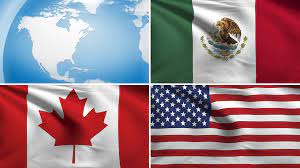Introduction
The United States-Mexico-Canada Agreement (USMCA) was negotiated to modernize and update the North American Free Trade Agreement (NAFTA). As part of this effort, Mexico’s labor laws have been updated and strengthened.
USMCA has a new, stronger chapter on labor. It contains enforceable labor obligations with real consequences for labor violations.
- USMCA has a new, stronger chapter on labor.
- It contains enforceable labor obligations with real consequences for labor violations.
- It creates an obligation to promote and enforce domestic labor laws, including respect for the right to collective bargaining.
USMCA creates an obligation to promote and enforce domestic labor laws, including respect for the right to collective bargaining.
Under the deal, all three countries must mandate collective bargaining and require companies to negotiate with unions when a majority of workers petition for representation. In Mexico, which has the option of implementing these reforms through collective agreements or legislation, companies must respect the results either way. Major labor reforms were introduced in Mexico in 1990 but have failed to attract sufficient union membership.
USMCA imposes new requirements on governments to ensure that their labor laws are consistent with international standards.
- The United States, Canada and Mexico have agreed to establish a new facility-specific rapid response labor mechanism that ensures remedies are provided in cases of violations of workers’ rights.
- This mechanism will allow for the swift resolution of labor disputes between employers and workers who are covered by the USMCA.
Under USMCA, all three countries must mandate collective bargaining and require companies to negotiate with unions when a majority of workers petition for representation.
Under USMCA, all three countries must mandate collective bargaining and require companies to negotiate with unions when a majority of workers petition for representation. In the United States, this only applies to private-sector employees and does not cover government workers.
In Canada and Mexico, USMCA requires that companies negotiate with unions as long as they can convince at least 50% of the workforce to sign cards requesting union representation. These two countries also allow workers to be represented by any union that has been certified by federal or provincial authorities.
Under USMCA, if a company does not respond positively to an employee’s request for recognition within 15 days after receiving it (or 30 days in Mexico), then the labor board will determine whether there should be an election held among all eligible voters (which includes temporary staff).
In Mexico, which has the option of implementing these reforms through collective agreements or legislation, companies must respect the results either way.
In Mexico, which has the option of implementing these reforms through collective agreements or legislation, companies must respect the results either way. Along with a new, stronger chapter on labor that contains enforceable labor obligations with real consequences for violations (including the possibility of fines), this means that Mexican workers now have more power to make their voices heard.
It can be difficult for unions in Mexico because many companies undermine them by using subcontractors who are not unionized. There is also a lot of fear about safety and other problems at work, especially sexual harassment.
The United States, Canada and Mexico have agreed to establish a new facility-specific rapid response labor mechanism that ensures remedies are provided in cases of violations of workers’ rights.
In addition to the new tripartite agreement, the United States, Canada and Mexico have agreed to establish a new facility-specific rapid response labor mechanism that ensures remedies are provided in cases of violations of workers’ rights.
The mechanism will be available to workers who have been victims of violations of labor laws. If there has been a violation in one facility but not another, this system will ensure that all workers receive compensation they are owed as soon as possible.
Mexico’s government will issue a public petition inviting civil society organizations to offer recommendations for improvements in compliance with labor laws, enforcement mechanisms and dispute resolution.
Mexico’s government will issue a public petition inviting civil society organizations to offer recommendations for improvements in compliance with labor laws, enforcement mechanisms and dispute resolution.
The Ministry of Labor and Social Welfare (STPS) will hold a series of meetings with non-governmental organizations throughout the country to discuss how best to implement these initiatives.
Conclusion
It’s clear that the USMCA is a strong accord that promotes and protects workers’ rights. It will help workers in all three countries, including those who are currently working without full protections or collective bargaining rights.











